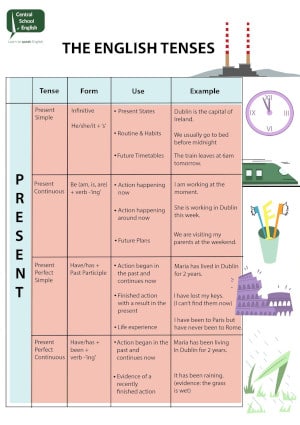Present perfect continuous
Welcome to another blog post by Central School of English, Dublin.
If you are keen on grammar or just keen on understanding English better, you’re in the right place.
Today we are going to be looking at the Present perfect continuous tense!
What is the Present perfect continuous tense?
Duration of an action
We use the present perfect continuous for 2 reasons:
- The duration of an action up to now
- Evidence now of a recent activity
When talking about the duration of an action up to now, we are talking about an action that started in the past and continued up to now. We are emphasizing how long something has been happening. We have seen before that we can use the present perfect simple to say this too but instead of an action in progress(present perfect contiuous), in the present perfect simple it is an activity/state that is still true.
Compare these two sentences:
“I have lived in Ireland for 3 months.” (Present perfect simple – activity that is true)
“I have been living in Ireland for 3 months.” (Present perfect continuous – action still in progress)
In both of these sentences, the emphasis is on the duration that the person has lived in Ireland.
To form the present perfect continuous structure, we use:
subject + have/has + been + present participle(ing)
Look at these examples:
“He has been studying for the exam for 3 hours. He needs a break”
“We have been planning the trip for months. I can’t wait to go.”
“They have been looking at the shoes for 30minutes now.”
Also, as you have previously learnt, we use the word for and a time period to express the duration.
You can also use since to refer back to the point at which the period began:
” I have been learning English at the school since January. It’s so good!”
Present perfect continuous - Duration
We use have + been + present participle to talk about the duration of an action up to now
Evidence now of a recent activity
The second use of the present perfect continuous is to talk about evidence of recent activity.
If a child comes into the house soaking wet, we have evidence that it was recently raining, and so we can use the present perfect continuous here:
“The boy is wet. It must have been raining.”
Some more examples of this could be the following:
“The children are angry, they must have been fighting.”
“She looks look she just woke up, she must have been sleeping.”
“You look really fit, have you been working out?”
To make a question we use : Have/Has + subject + been + present participle
To make the negative we use : Subject + have/has not + been + present participle
e.g. “I haven’t been studying at all.”
Present perfect continuous - Recent activity
We use have + been + present participle to talk about evidence now of a recent activity
Test Yourself
Make predictions based on the evidence you are given in the sentences.
Example: Andrew comes home with many shopping bags in his hands. What is this evidence of?
Answer: I think Andrew has been shopping
- Your best friend was on the phone to her boyfriend and her eyes are really red and her face is wet. What do you think?
- You arrive at your friend’s house and see some paint cans and equipment in the room. What have they been doing?
- Your boss is at your job and he looks angry and your workmates look sad and very quiet. What has been happening?
- You meet your friend you haven’t seen for a long time and they look very slim. What can you say to them?
Test Yourself
Choose the correct answer to complete the sentences
Vocabulary
Soaking wet: extremely/completely wet
Fit: in shape/healthy
Workmate: somebody who we work with i.e. colleague
Phrasal Verbs
To be keen on: To be really interested in something/someone
Example: He is really keen on sports. He is always playing football.
I hope you enjoyed today’s blog and found it helpful.
If you would like to learn more, head on over to our grammar section where you can find more interesting grammar topics. Learning never stops.
If you’d like information on our English courses in Dublin, please do not hesitate to contact us.
We now have courses online so can join us from anywhere in the world!





